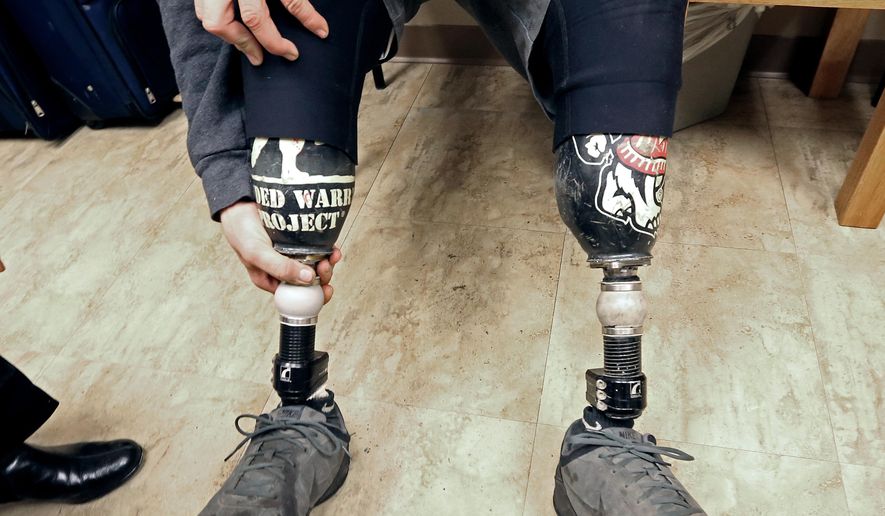OPINION:
It is easy to dismiss op-ed articles written by industry representatives as purely self-interested. That may be true for some, but not for me. While I am concerned for professional reasons about a proposed Medicare rule that would reverse the standard of care for 2 million American amputees, I also have a very personal reason for my opposition.
I was raised by a man who was a bilateral lower limb amputee. He worked his whole life, eventually managing the local branch of a national company. After a week’s work, he often was not able to wear his then-rudimentary prostheses because of sores or pain — or both. So, on those weekends, he was housebound.
He made his branch the highest-performing unit in the entire company. I can remember as a boy of 10 watching his eyes glisten with held-back tears when he read a response to his request for a raise: “While we recognize and appreciate your achievements, you should also recognize as a handicapped person you should be grateful you have a job.”
That’s how America dealt with amputees then no matter how well they performed or how hard they worked. It was reflected in part in the standard of care that took a long time to improve. Like my peers, I have spent my 40-plus-year career working to move persons with limb loss out of the shadows of society, away from the public notion that they are “disabled,” and prevent having them ever experience the degradation of discrimination because they use a prosthesis. We have succeeded. People wearing prostheses today are a health care success story. And they are more than that: They are an American success story.
That is why I will not stand by silently and let an ill-conceived Medicare policy turn back the clock on these good people.
What I am concerned about?
An estimated 2 million American amputees would see significantly reduced access to care under a rule proposal now pending before Medicare. The draft Medicare rule would revert to an early-1970s standard of care when the prosthetics available to amputees were less functional and provided less mobility. The proposed changes in coverage for services provided to amputees not only would have a devastating impact on Medicare beneficiaries, but on all of the 2 million amputees in the United States, since commercial health insurance payers and the Department of Veterans Affairs tend to follow the lead of Medicare on coverage matters.
It is very difficult to imagine any other aspect of American health care where millions of people would be denied available and appropriate treatment and devices that can speed their return to the fullest and most active possible life. Even worse, there is no medical or scientific justification for these unreasonable and inappropriate hurdles that would reverse advances in care for amputees. In fact, quite the opposite is true. There is medical and scientific evidence supporting today’s standard of care.
Among the key concerns about the proposed Medicare policy restricting care for amputees are the following:
• If you are an amputee using — or who has used in the past — an assistive device such as a cane, crutch or walker, you will be limited to less functional prosthetic devices — even if you only use the assistive device briefly or for limited purposes, such as getting out of bed at night to go to the bathroom.
• You could be provided a less functional prosthesis or denied a device altogether just because you may not be able to attain the “appearance of a natural gait.” This would be a huge setback. Patients who never achieve a truly “natural gait” today can and do rely on prostheses to live a full life.
• If your medical record references certain health issues, including such common conditions as high blood pressure and asthma, Medicare could deny you access to the currently available care. With no sound scientific basis, this arbitrary provision would unfairly and needlessly knock hundreds of thousands of amputees out of consideration for the most appropriate prosthetic device for their needs.
• The Medicare proposal redefines the rehabilitation process for amputees and forces new amputees to undergo rehab using out-of-date technology that they will not even use once they receive their permanent prosthesis. This means that the rehab for amputees will be of less value than if it was carried out with the most appropriate prosthesis for their needs, as is common practice today.
I question the motivation for such an indiscriminate policy aimed at those Medicare beneficiaries whose prosthetic care amounts to less than one-third of 1 percent of the total Medicare budget. If the goal was to save money, Medicare decided to shoot a rabbit with a missile. No other sector of health care has been thrown backward by Medicare to a lesser standard of care. We just can’t allow that to happen here.
The millions of people at risk deserve the standard of care they have now and the dignity it affords them. They have today what my father never had — and all fair-minded Americans should be intent on not letting Medicare turn back the hands of time.
• Charles Dankmeyer is president of the American Orthotic and Prosthetic Association.




Please read our comment policy before commenting.